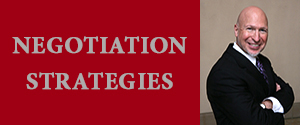

Introduction
Defining negotiation as “making the deal” is a common misconception. The deal is really only the successful conclusion of an effective negotiation process. It is however, the process used to achieve the desired negotiated outcome, which accurately defines negotiation.
An effective negotiation process expands dialogue and develops crucial information around which a deal might be structured. Effective dialogue and productive information development is driven by advanced questioning and strong probing skills.
Negotiation theory draws on various disciplines including psychology, mathematics (game theory), communications, anthropology, sociology and others. I would like to draw on philosophy, specifically Cartesian logic, to introduce you to a simple, yet powerful questioning technique to add to your negotiation quiver.
The Four Cartesian Questions
At the core of Cartesian logic, credited to the French philosopher Rene Descartes, (1596-1650), is a set of four simple questions that are useful in evaluating any action or decision. The questions are (where X is the question or action you are contemplating):
Read more -->
Defining negotiation as “making the deal” is a common misconception. The deal is really only the successful conclusion of an effective negotiation process. It is however, the process used to achieve the desired negotiated outcome, which accurately defines negotiation.
An effective negotiation process expands dialogue and develops crucial information around which a deal might be structured. Effective dialogue and productive information development is driven by advanced questioning and strong probing skills.
Negotiation theory draws on various disciplines including psychology, mathematics (game theory), communications, anthropology, sociology and others. I would like to draw on philosophy, specifically Cartesian logic, to introduce you to a simple, yet powerful questioning technique to add to your negotiation quiver.
The Four Cartesian Questions
At the core of Cartesian logic, credited to the French philosopher Rene Descartes, (1596-1650), is a set of four simple questions that are useful in evaluating any action or decision. The questions are (where X is the question or action you are contemplating):
- What would happen if you did X?
- What would happen if you didn’t do X?
- What won’t happen if you did X?
- What won’t happen if you didn’t do X?
Read more -->